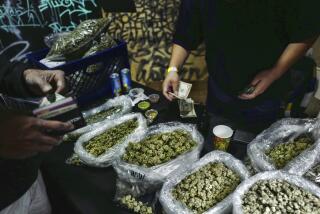U.S. High Court to Hear Case of Confiscated Cash
WASHINGTON â Hosep Bajakajian, the owner of two Hollywood gas stations who went to Los Angeles International Airport with more than $357,000 in cash in his luggage and had it confiscated by federal officials, will not get his money back until next year, if at all.
The Supreme Court announced Tuesday that it will hear the Justice Departmentâs claim that Bajakajianâs money fit the definition of âsmuggled cashâ that can be seized and kept by federal authorities, even if the money is otherwise entirely legal. The case will be argued in the fall, with a ruling due in the first half of 1998.
Had the justices rejected the governmentâs appeal, Bajakajianâs money would have been returned to him, three years after it was seized because he had failed to report the movement of $10,000 or more in cash across a U.S. border.
The U.S. 9th Circuit Court of Appeals, on a 2-1 vote, said last year that it was unconstitutional for the government to seize all of Bajakajianâs funds over a crime whose penalty is a $5,000 fine.
Bajakajian pleaded guilty to not reporting the currency transaction, but he has fought the forfeiture for three years. He said he was taking the cash to Syria to repay a relative who helped finance his business.
âHe should be punished for his crime, but we believe it is manifestly unfair to take his property too,â said Encino attorney James E. Blatt, who represents Bajakajian.
Federal prosecutors insist it was both legal and constitutional for them to keep the seized funds.
âForfeiting the smuggled currency as a sanction for the felony of willfully failing to report the transportation of cash is not excessive,â the Justice Department said in its appeal of U.S. vs. Bajakajian, 96-1487.
The case puts a spotlight on the governmentâs broad forfeiture power. In most instances, the Supreme Court has backed up this power. Last year, for example, the justices, in a 5-4 ruling, said âinnocent ownersâ of boats, cars or airplanes can have their property seized if it has been used in a crime, such as moving drugs.
In Bajakajianâs case, the court will decide whether the forfeiture of so much money violates the 8th Amendmentâs ban on âcruel and unusual punishment and excessive fines.â
In a 1994 ruling, U.S. District Judge John Davies in Los Angeles said the forfeiture of all Bajakajianâs cash would be âextraordinarily harshâ and therefore unconstitutionally excessive. The 9th Circuit went further and ruled that any forfeiture for a âmere failure to reportâ the transaction was unconstitutional.
But other federal courts have upheld such forfeitures, and that split almost assured that the high court would review the case.
More to Read
Sign up for Essential California
The most important California stories and recommendations in your inbox every morning.
You may occasionally receive promotional content from the Los Angeles Times.










